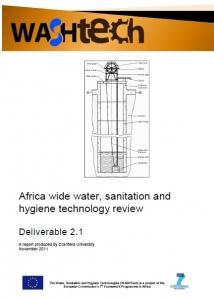The WASHTech project has published a literature review focusing on 14 technologies used in Africa in the water, sanitation and hygiene (WASH) sector. Descriptions for each technology include a selection of interesting case studies, and an explanation as to whether the technology meets technical, financial, social and institutional success criteria.
Published on: 16/12/2011

The WASHTech project has published a literature review [1] focusing on 14 technologies used in Africa in the water, sanitation and hygiene (WASH) sector.
Descriptions for each technology include a selection of interesting case studies, and an explanation as to whether the technology meets technical, financial, social and institutional success criteria.
Only two technologies met all four success criteria: hand dug wells and the India Mark II pump, and the latter only with the caveat that there was a functional maintenance system.
The least successful technology was the Playpump. Pending further research, jerry cans and the gulper were only found to meet one success criteria (technical success). Except for bio-additives to pit latrines and Playpumps, all other technologies were technically successful. The other success criteria were met by roughly half of the technologies.
Core issues that WASHTech plans to take up further include the appeal of inappropriate technologies like Playpumps and Lifestraws to naive donors, and ways to get government approval for low-cost, locally managed technologies like rope pumps, biosand filters, constructed rainwater harvesting jars, water jetting and tippy taps.
[1] Parker, A. et al., 2011. Africa wide water, sanitation and hygiene technology review. (WASHTech Deliverable 2.1). The Hague: WASHTech c/o IRC International Water and Sanitation Centre and Cranfield: Cranfield University. 93 p. : 1 box, 9 fig., 1 tab. Includes references.
Available at: http://wp.me/a1szDW-1o
The aim of the WASHTech project (2011-2013) is to introduce a robust Technology Assessment Framework (TAF), with local partners in Burkina Faso, Ghana and Uganda, that will assess the potential of new innovative WASH technologies. WASHTech is co-funded under the 7th Framework Programme of the European Commission’s Africa research programme.